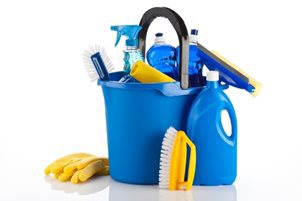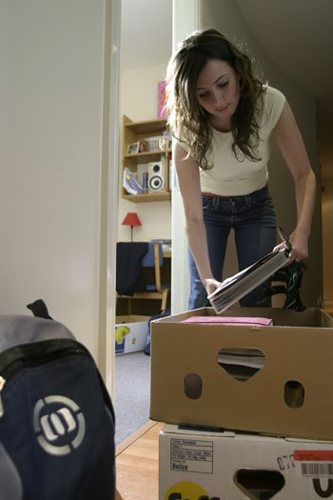Whether you are moving in or out of a property, there will be things you can do beforehand to make it is as stress-free as possible. So read on and get clued up!
Moving out
As long as you have time to plan your move and know what is expected of you, moving out of your student property can be really simple and pain-free. Watch the video below and read through this guide for moving-out tips and information on getting your deposit back.
Cleaning

If you are renting a shared property you are all jointly responsible for its condition when you move out, although the degree of joint liability can vary depending on the type of tenancy agreement you’ve signed. As a rule of thumb, communal areas will almost always be the responsibility of everyone. Remember all the landlord/agent wants is a property returned in an acceptably clean condition to hand over to the new tenants moving in.
- Work out in advance how you will clean the property and divide up the tasks for the communal areas which includes: kitchen, bathroom, lounge, corridors, stairs and any outside space and cellar area.
- It's a good idea to talk to your housemates now and agree a day to get together to clean the property so that the last person to move out isn't left to do it all.
- Use a checklist to keep you on track.
Avoid deposit deductions by cleaning thoroughly.
Bathroom
Failing to clean the toilet or the bathroom suite can reduce your deposit return by £50 - £100. This would be the cost for professional cleaners to clean the area properly.
Oven and grill
This could require 2 visits from cleaners as cleaning fluid has to be left overnight, so this could cost in excess of £95.
Top tips
- Why not ask your landlord/agent to do an inspection to point out anything you need to do to return the house in an acceptable condition?
- Taking a stand and not cleaning the house because no one else is will not be an acceptable reason for your landlord! You will all end up losing some of your deposits.
Deposits & the Tenant Fees Act 2019
Under the Tenant Fees Act the landlord cannot require a tenant to pay for a professional clean, however you are responsible for ensuring that the property is returned in the condition that you found it, aside from any fair wear and tear.
Fair wear and tear is considered to be a defect which occurs naturally or as part of the tenant’s reasonable use of the premises. If you do not leave the property in a fit condition, the landlord can recover costs associated with returning the property to its original condition and/or carrying out necessary repairs by claiming against your deposit. The landlord would need to justify the costs by providing suitable evidence (e.g. an independently produced inventory, receipts and invoices).
Read more about the Tenant Fees Act
Utility bills - closing your accounts
A few weeks before you move out, contact your utility companies and let them know the final date of your tenancy. Read the meters on the final day and inform the company to close your account and get the final bill sent on to your forwarding address. Keep a record of the meter readings. As soon as you have paid the final bills, make sure you send proof to the landlord/agent.
Moving in
Before you arrive
- Make sure you have contact details for your landlord and arrange a collection time for your keys.Top Tip: if there is a burglar alarm, make sure the landlord gives you the code so you can use it straightaway.
- Make sure you have a copy of your tenancy agreement for reference purposes.
- Make sure you know which bank account you will be using to pay your rent: it is important that rent payments are made on time, or you may be charged.
- If you bring a car with you, make sure to find out how parking works outside your house. Visit your local council's website to apply for a permit if needed. If you do receive a ticket while your application for a permit is being processed, you can appeal.
- If a permit is required you may also need to organise a visitor’s permit for parents or anyone helping you move in!
On the day

Be careful when you are moving your belongings in. Don’t leave the car or house open and unattended, as this is a prime time for opportunist thieves to steal your valuables!
Once you're inside your property, check it thoroughly and consider how it compares with when you saw it at the time of signing the contract. Take photos of the property (including any wear and tear damage) so that you have proof of its condition as you take over the occupancy. Inform the owner straightaway of anything you are concerned about.
Check off the fixtures and fittings against the inventory (if available) and if anything is missing or damaged, make a note of it, take a photo and once again contact the landlord. If you do not report things at this point, you may find yourself paying for it out of your deposit at the end of the year.
All properties should have a Periodic Electrical Safety Certificate and a Gas Safety Certificate, and your landlord should make these available to you. Make a note of the renewal dates so that you are aware of whether they will need renewing during your tenancy.
If there are any issues with cleanliness, fire escapes, repairs, decoration or furniture, inform the landlord in writing straight away so they can sort it for you and to prove any issues were pre-existing.
Utilities - setting up your accounts
Take meter readings of your gas, electricity and water meters immediately. Register with the relevant utility companies and, if possible, register everyone in the house, so that no one has to take individual responsibility.
Check you can find the stop taps for water, gas and electricity. Ask your landlord for help if you can't locate them.
Security
Security can be a risk in areas that are popular with students. There are however a number of things you can do to reduce these risks.
- If a burglar alarm has been fitted to your property, make sure you find out how to activate it and switch it on whenever the property is empty.
- Always lock exterior doors when coming in and out of properties and only leave windows unlocked if you are in the same room.
- Even when in the house, keep exterior doors locked to prevent intruders from entering.
- Be wary of people calling at your door unexpectedly. Ask for ID from visitors claiming to require access to your home for a specific reason.
- Ensure bikes are locked up securely.
- Consider taking out insurance for your valuable belongings.
Bike marking
Unfortunately cycle theft, especially on campus, is a fairly common crime. If you have your bike marked, police will be able to track your bike and get it back to you, if it has been stolen and subsequently recovered.
Change of address
There are some people you may need to inform of your change of address. You may want to consider:
- University (when you re-register at the start of term)
- Your bank
- Your car insurance provider
- Utility companies
Getting on with the neighbours
Many student houses are in residential areas of the city and you are therefore part of a wider community. There are many things you can do to live in the community harmoniously.
When you arrive, introduce yourselves to your immediate neighbours and find out what they’re like. If they’ve got young children who may be disturbed by noise, be sensitive to this. Tell your neighbours about any parties and keep the noise down after 11pm. If you’re coming home late at night don’t talk loudly outside or bang car doors. Chances are that if you are considerate, your neighbours will be less likely to complain and more likely to look after your house while you’re away. This helps to improve the general security of the area.
Complaints?
If your landlord isn't accredited, you still have access to an independent complaints scheme called 'Right of Redress' - for more info click here.

